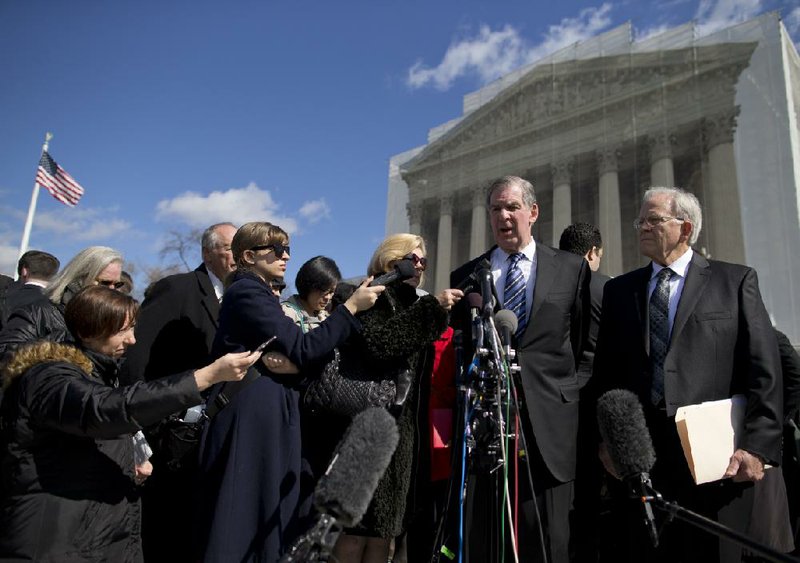WASHINGTON — The U.S. Supreme Court heard arguments Wednesday in a case that tested civil-rights era legislation designed to eliminate discrimination on Election Day, giving black voters and other minority groups more of a voice.
In Shelby County v. Holder, Shelby County, Ala., argued that Congress overstepped its authority when it passed the Voting Rights Act of 2006- an update of the original 1965 act.
The act requires federal “pre-clearance” of any voting procedure changes, such as changes in polling locations, voter qualifications or voting schedules.
Alabama is one of 10 states covered by Section 5 of the act, which determines which states need federal permission before they can alter their voting rules.
When the act was first passed in 1965, it targeted all states that were using a “test or device” such as a literacy test to disenfranchise voters - Alabama, Georgia, Louisiana, Mississippi, South Carolina, Virginia and Alaska.
Also covered were states in which less than 50 percent of the residents were registered to vote in the 1964 presidential election or where less than 50 percent of people of voting age voted.
Since Arkansas law didn’t call for a literacy test and had high enough levels of voter registration and participation, it did not face the same level of scrutiny as states in the Deep South.
The act has been extended four times since 1965; it isn’t scheduled to expire until 2032.
Over the years, the list of states facing federal voting scrutiny has grown. And the federal government now ensures that “language minorities” as well as racial minorities are not discriminated against at the ballot box - intentionally or otherwise.
“It seems to me one might reasonably think this: it’s an old disease, it’s gotten a lot better, a lot better, but it is still there,” Justice Stephen Breyer said. “So if you had a remedy that really helped it work, but it wasn’t totally over, wouldn’t you keep that remedy?”
Burt Rein, who argued on behalf of Shelby County, said the formula for determining which states are covered isout of date.
“What happened in Alabama in 1965, that Alabama itself has said was a disgrace, doesn’t justify a current burden,” he said. “Congress cannot arbitrarily pick out states. Congress has to treat states with equal dignity.”
Arguing on behalf of the federal government, Solicitor General Donald Verrilli said the Voting Rights Act helped eradicate a “blatantly racist vote-suppression that characterized parts of this country for a century.”
Justice Elena Kaganadded that the states covered by the act have less than 25 percent of the nation’s population, yet account for 56 percent of successful voter discrimination lawsuits.
“The formula seems to be working pretty well,” Kagan said.
Justice Antonin Scalia said that when Congress last reauthorized the act in 2006, the unanimous vote for it in the Senate was based “on a phenomenon that is called ‘perpetuation of racial entitlements.’”
Scalia suggested that senators voted for the act in order to not appear racially biased, and that it would be reauthorized two decades from now unless a court ruled it unconstitutional.
“You have to show, when you are treating different states differently, that there is a good reason for it,” he said.
Chief Justice John Roberts and other conservatives on the bench suggested that voter registration is no longer a valid factor in determining discrimination and that Congress should have tried other approaches when it reauthorized the act in 2006. Roberts said the state with the lowest percentage of black voter turnout was Massachusetts. Black voter participation is the highest, he said, in Mississippi, one of the states covered by the act.
Verrilli defended the act and said it had been upheld by the court four times since 1965.
Justice Anthony Kennedy, who many observers said would likely provide the swing vote in the decision, suggested to Verrilli that the law had had its day.
“The Marshall Plan was very good, too,” he said, referring to the U.S. policy of reconstructing Europe after World War II, “but times change.”
Though Arkansas has never needed automatic federal “pre-clearance” of changes to its voting laws, it was placed temporarily under the act on at least one occasion.
States and jurisdictionsthat do not fit the criteria for pre-clearance under the act can be “bailed-in,” or forced to obtain pre-clearance, if it is found that they do not comply with the Voting Rights Act on a specific occasion.
In a 1989 case, Jeffers v. Clinton, the U.S. District Court for the Eastern District of Arkansas held that the reapportionment of electoral districts in 1981 discriminated against blacks, resulting in fewer black lawmakers being elected to the Arkansas General Assembly.
Arkansas appealed the decision to the Supreme Court in 1990. After U.S. Solicitor General Kenneth Starr wrote an amicus brief siding with Jeffers and the other plaintiffs, Arkansas withdrew its appeal and created a redistricting plan.
Dale Charles, the president of the Arkansas chapter of the National Association for the Advancement of Colored People, said it was unfortunate that Arkansas was not covered under the act like its neighboring states are.
But, he said, voter discrimination is not rampant in Arkansas.
“I don’t think we have the same issues as other states,” he said.
Front Section, Pages 1 on 02/28/2013


